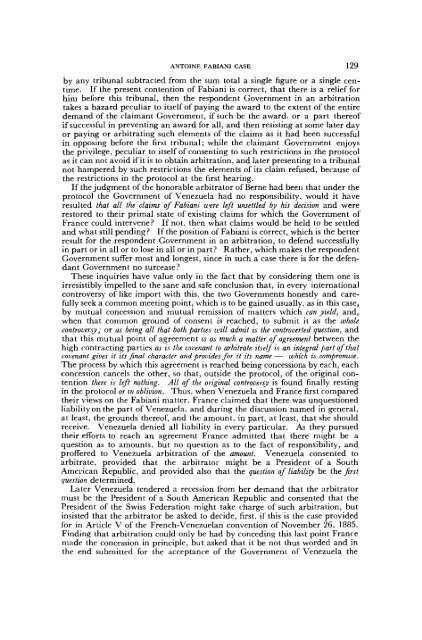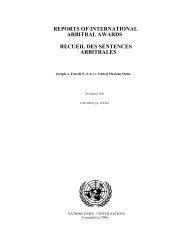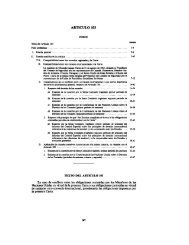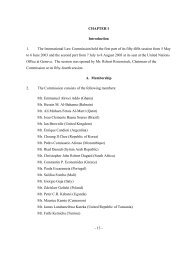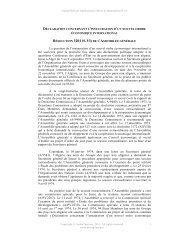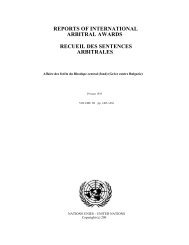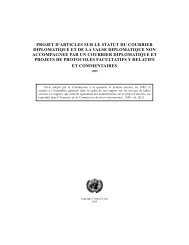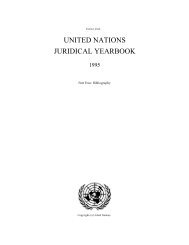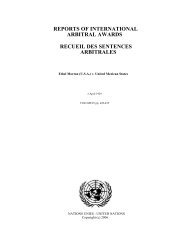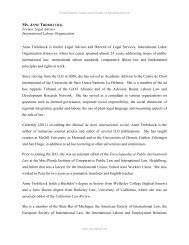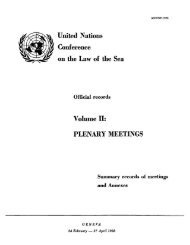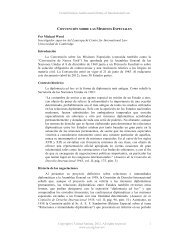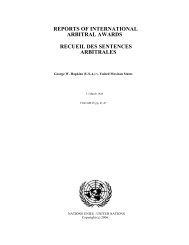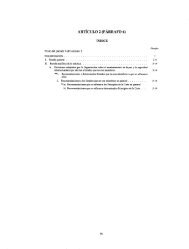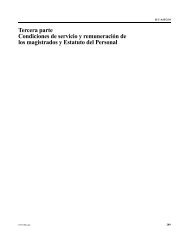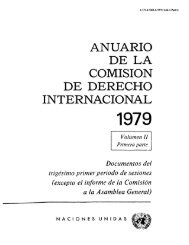Antoine Fabiani Case - United Nations Treaty Collection
Antoine Fabiani Case - United Nations Treaty Collection
Antoine Fabiani Case - United Nations Treaty Collection
You also want an ePaper? Increase the reach of your titles
YUMPU automatically turns print PDFs into web optimized ePapers that Google loves.
ANTOINE FABIANI CASE 129<br />
by any tribunal subtracted from the sum total a single figure or a single centime.<br />
If the present contention of <strong>Fabiani</strong> is correct, that there is a relief for<br />
him before this tribunal, then the respondent Government in an arbitration<br />
takes a hazard peculiar to itself of paying the award to the extent of the entire<br />
demand of the claimant Government, if such be the award, or a part thereof<br />
if successful in preventing an award for all, and then resisting at some later day<br />
or paying or arbitrating such elements of the claims as it had been successful<br />
in opposing before the first tribunal ; while the claimant Government enjoys<br />
the privilege, peculiar to itself of consenting to such restrictions in the protocol<br />
as it can not avoid if it is to obtain arbitration, and later presenting to a tribunal<br />
not hampered by such restrictions the elements of its claim refused, because of<br />
the restrictions in the protocol at the first hearing.<br />
If the judgment of the honorable arbitrator of Berne had been that under the<br />
protocol the Government of Venezuela had no responsibility, would it have<br />
resulted that all the claims of <strong>Fabiani</strong> were left unsettled by his decision and were<br />
restored to their primal state of existing claims for which the Government of<br />
France could intervene? If not, then what claims would be held to be settled<br />
and what still pending? If the position of <strong>Fabiani</strong> is correct, which is the better<br />
result for the respondent Government in an arbitration, to defend successfully<br />
in part or in all or to lose in all or in part? Rather, which makes the respondent<br />
Government suffer most and longest, since in such a case there is for the defendant<br />
Government no surcease?<br />
These inquiries have value only in the fact that by considering them one is<br />
irresistibly impelled to the sane and safe conclusion that, in every international<br />
controversy of like import with this, the two Governments honestly and carefully<br />
seek a common meeting point, which is to be gained usually, as in this case,<br />
by mutual concession and mutual remission of matters which can yield, and,<br />
when that common ground of consent is reached, to submit it as the whole<br />
controversy ; or as being all that both parties will admit is the controverted question, and<br />
that this mutual point of agreement is as much a matter of agreement between the<br />
high contracting parties as is the covenant to arbitrate itself is an integral part of that<br />
covenant gives it its final character and provides for it its name — which is compromise.<br />
The process by which this agreement is reached being concessions by each, each<br />
concession cancels the other, so that, outside the protocol, of the original contention<br />
there is left nothing. All of the original controversy is found finally resting<br />
in the protocol or m oblivion. Thus, when Venezuela and France first compared<br />
their views on the <strong>Fabiani</strong> matter. France claimed that there was unquestioned<br />
liability on the part of Venezuela, and during the discussion named in general,<br />
at least, the grounds thereof, and the amount, in part, at least, that she should<br />
receive. Venezuela denied all liability in every particular. As they pursued<br />
their efforts to reach an agreement France admitted that there might be a<br />
question as to amounts, but no question as to the fact of responsibility, and<br />
proffered to Venezuela arbitration of the amount. Venezuela consented to<br />
arbitrate, provided that the arbitrator might be a President of a South<br />
American Republic, and provided also that the question of liability be the first<br />
question determined.<br />
Later Venezuela tendered a recession from her demand that the arbitrator<br />
must be the President of a South American Republic and consented that the<br />
President of the Swiss Federation might take charge of such arbitration, but<br />
insisted that the arbitrator be asked to decide, first, if this is the case provided<br />
for in Article V of the French-Venezuelan convention of November 26, 1885.<br />
Finding that arbitration could only be had by conceding this last point France<br />
made the concession in principle, but asked that it be not thus worded and in<br />
the end submitted for the acceptance of the Government of Venezuela the


